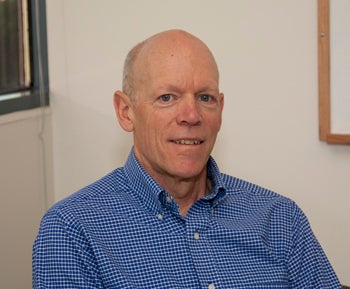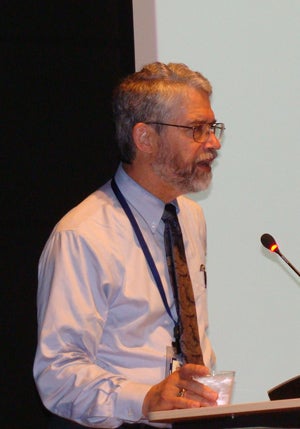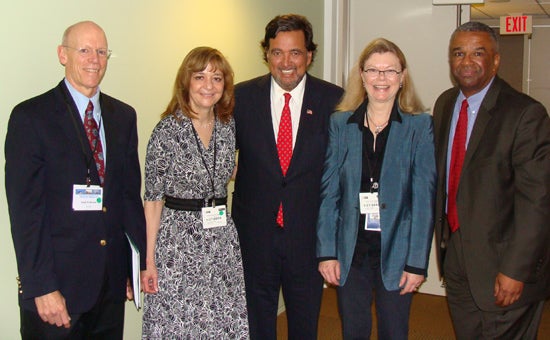The National Climate Adaptation Summit and UCAR’s role in building resiliency
Jun 9, 2010 - by Staff
Jun 9, 2010 - by Staff
9 June 2010 • “It was the best of times, it was the worst of times, it was the age of wisdom, it was the age of foolishness, it was the epoch of belief, it was the epoch of incredulity….”
 If I could pick some words to describe today’s complex world of climate research, policy, and advocacy, I’m not sure I could pick any better than these famous words from the opening to Charles Dickens’ A Tale of Two Cities. Although the public and political dialogue is often heated, the science surrounding climate change has never been more rigorous and exciting, and there has probably never been a time when the science community was more poised to help on this important issue.
If I could pick some words to describe today’s complex world of climate research, policy, and advocacy, I’m not sure I could pick any better than these famous words from the opening to Charles Dickens’ A Tale of Two Cities. Although the public and political dialogue is often heated, the science surrounding climate change has never been more rigorous and exciting, and there has probably never been a time when the science community was more poised to help on this important issue.
While national climate adaptation and mitigation politics plod slowly along, many of America’s cities are making great strides to plan for a changing climate and doing it in a way that makes sense regardless of the exact scale of changes (for example, adopting policies and programs that reduce dependence on oil, conserve water, increase energy efficiency, and generally make communities nicer places to live).
UCAR members are not strangers to the topic of climate resiliency. In 2008, the UCAR community partnered with other groups to develop a transition document that provided weather and climate recommendations to the incoming Obama administration and Congress. In 2008 and 2009, the UCAR annual meetings were dedicated to examining our role in making our nation more resilient to a changing climate and associated severe weather. The 2009 meeting (covered in UCAR Magazine) highlighted how several of our member universities were helping New York City and Chicago with their climate adaptation planning efforts.
 John Holdren, the science advisor to President Barack Obama, addresses the summit. (Photo courtesy Jack Fellows.)
John Holdren, the science advisor to President Barack Obama, addresses the summit. (Photo courtesy Jack Fellows.)
The conversation within the UCAR community continues during our 50th anniversary year, and in the next year we plan to discuss our role in helping create the next-generation leaders and workforce who will address the challenge of climate resiliency. In many respects, there are few groups more able to help in this critical national effort than the UCAR community. Our country has invested in us for over 50 years; this is an opportunity for us to pay our country back by helping local and regional decision makers ensure that their communities will have reliable access to water, food, energy, and health resources and services in the face of a changing climate.
Based on the transition document and many other interactions, President Obama’s science advisor, John Holdren, asked UCAR to convene a National Climate Adaptation Summit, held in Washington, D.C., on 25–27 May. This invitational summit brought together some 200 invited users and providers of climate adaptation information from diverse regions and economic sectors. A rich set of talks and breakout activities provided invaluable insights into what is needed for effective climate adaptation and vulnerability assessment and how we should be organized to do that, in both the public and private sectors and from federal to local levels.
Much of the summit was webcast, and the online archive will be very useful in the classroom and beyond. It includes interesting and inspiring keynote talks from New Mexico governor Bill Richardson, U.S. Secretary of Agriculture Tom Vilsack, Holdren, and many others. Many of your colleagues helped to plan the summit, and a report team is now summarizing its conclusions. The preliminary goals include:
The summit report being provided to Holdren will serve as important input for federal efforts related to climate adaptation, including the White House Climate Adaptation Task Force and the U.S. Global Change Research Program. Through these and other advocacy efforts, UCAR has become a sought-after voice on climate research, education, and policy matters. Although it may be a confusing time for climate change politics and policies, rest assured that our community is making a substantial difference in this debate. We’ll keep you posted as things develop.
 Pictured at the summit are (left to right) Jack Fellows; Rosina Bierbaum, University of Michigan; Bill Richardson, governor of New Mexico; Shere Abbott, associate director for environment, White House Office of Science and Technology Policy; and Ron Sims, deputy secretary, U.S. Department of Housing and Urban Development. Fellows, Bierbaum, and Abbott were co-chairs of the summit.
Pictured at the summit are (left to right) Jack Fellows; Rosina Bierbaum, University of Michigan; Bill Richardson, governor of New Mexico; Shere Abbott, associate director for environment, White House Office of Science and Technology Policy; and Ron Sims, deputy secretary, U.S. Department of Housing and Urban Development. Fellows, Bierbaum, and Abbott were co-chairs of the summit.